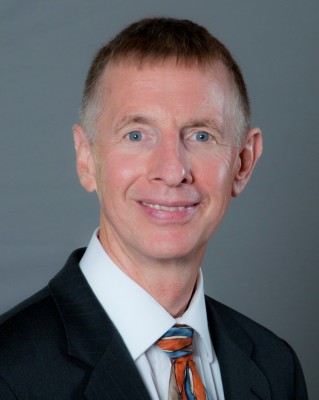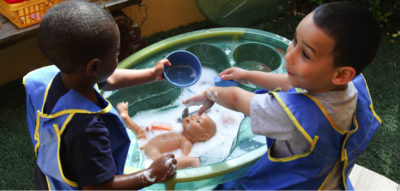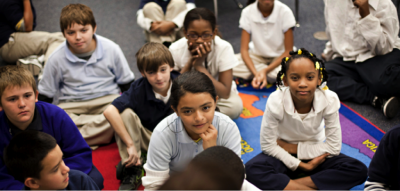
Glenn E. Good is Dean and Professor of the College of Education at UF. Good has authored more than 80 scholarly journal articles, chapters, and books—including Counseling and Psychotherapy Essentials: Integrating Theories, Skills, and Practices and The New Handbook of Psychotherapy and Counseling with Men. He has provided more than 180 presentations at national and international conferences, and has received approximately $1M in grants/contracts. His research focuses on evaluating the effectiveness of interventions for educational, psychosocial, and biomedical concerns. Prior to joining UF, Good was an Associate Dean and Professor at the University of Missouri. Good grew up in Northern California, and earned his bachelor’s degree in psychology at the University of California at Davis, his Master’s degree in counseling at the University of Oregon, and his PhD in counseling psychology from Ohio State University.
Take a moment to recall a teacher who really made a difference in your life. If you react similarly to others I have asked to do so, you are likely to identify at least one teacher who played a crucial positive role in your development. How did your special teacher influence your life? Did they interact with you in a way that showed that you mattered? Did they challenge you in new ways? Did they notice you as an individual in some way?
I would hypothesize that – in some way – these special teachers helped you engage with the learning process. The teacher who sparked my love of learning was a 7th grade science teacher; he got me (and the entire class) so intrigued with biology that I still remember the names of every bone in the body 40+ years later!
My science teacher, and the teacher you just recalled, are part of a network of professionals engaged in complex, sophisticated, and demanding work. Teachers have challenging jobs, through which they influence young lives—and society—on a daily basis.
While many gifted teachers make teaching look seamless and simple, it is far from it. As just one illustration, capturing and promoting the “on task” learning of detailed subject matter with a roomful of diverse students requires a sophisticated skill set and constant creativity.
Similarly, creating a school environment that supports the highest levels of learning for all students is a constant challenge for which educators in the U.S., and worldwide, deserve our respect, appreciation, and support.
To support the work of great teachers and school leaders, UF College of Education scholars work passionately to improve every aspect of the education process. From earliest childhood through higher education, UF researchers are studying every aspect of learning and instruction.
Our scholars are discovering how diverse children, adolescent, and adults most effectively master various subjects. They are developing new technologies that build upon students’ individualized learning styles. With these new technologies, every student, regardless of their background, has opportunities to receive personalized support for their learning and success 24/7 (for example, see Algebra Nation).
UF faculty are also helping school personnel, such as counselors and school psychologists, support diverse students’ learning and development. UF College of
Education scholars are also helping school leaders, such as principals and superintendents, and state and national
education policy leaders with the process of school improvement (for a nationwide example, see Dr. Mary Brownell and the CEEDAR Center).
Scholars at UF are also supporting educators in their journey to becoming master teachers and inspiring learning coaches. Inquiry is just one way that research faculty have identified to empower teachers. Inquiry involves educators carefully and intentionally observing and studying their own work. As noted by Dr. Nancy Dana, inquiry “empowers teachers to engage in research on their own practice, wrapping their learning around the learning of their students.”
While many UF education scholars do their important work alone or in teams, our positive
impact is clearly enhanced through our centers. The highly acclaimed Lastinger Center for Learning provided professional development services to districts and schools across the state and nation, and more recently across the globe.
Through their research and teaching, UF Education faculty are making a difference in the world of education. They are helping educators to prepare to be, and to continue to, make a difference in the lives of others. As you continue to hold your special teacher in your mind, UF educators continue to work with passion and diligence to support education in all its diverse aspects.

















I agree with Rachel as an Elementary teacher the best adcvie I could give you is finding a teacher that would be willing to let you go into there classroom. Teaching is hard work but very rewarding. You will never make a lot of money, have to deal with angry parents, spend a lot of your own money of resources for your classroom, and work a lot outside of school (grading, preparing etc) but if this is the right career for you all of these things become less important and trying to educate a teach achild is what really matters.If you want some questions when I was in college we had to go and observe and some questions I asked my cooperating teachers were:What is the most/ some rewarding things that you find as being a teacher?What are some of your challenges that you face? Hardest things about being a teacher?Describe a typical dayHow do you deal with angry parents? demanding?Why did you become a teacher?What keeps you teaching?What are three (or whatever number you want) things you wish you knew going into teaching your first year that you didn’t learn from school or student teaching?those are some things I thought of otherwise google what to ask my cooperative teacher? questions to ask a teacher?S